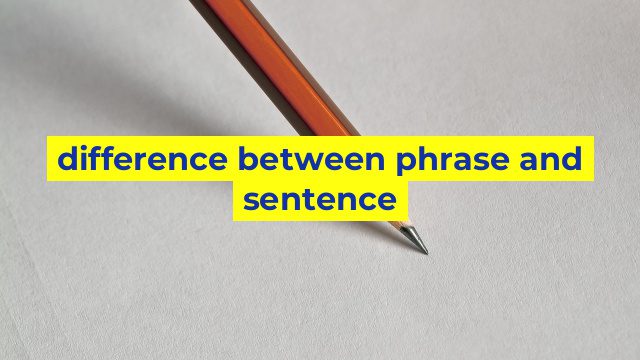Understanding the Difference Between a Phrase and a Sentence
When it comes to writing or speaking, two common terms that often come up are “phrase” and “sentence.” While these words may seem similar, they have distinct differences. Understanding these differences can help improve your communication skills and convey your thoughts more clearly.
What is a Phrase?
A phrase is a group of words that form a meaningful unit, but does not have a subject and a verb. It can include nouns, adjectives, adverbs, and prepositions. A phrase can be used in a sentence to make it more descriptive or to add information. Phrases are often used in literature to paint a vivid picture of a scene or setting. Examples of phrases include “in the morning,” “on the table,” “running fast,” “a sunny day,” and “to the store.”
What is a Sentence?
A sentence is a complete thought that consists of a subject and a predicate. A subject is the main noun or pronoun in the sentence that performs the action, while the predicate is the verb that describes what the subject is doing. A sentence can express a statement, question, command, or exclamation. Sentences can be simple, compound, complex or compound-complex. Examples of sentences include “The dog barked,” “She went to the store,” “Are you coming to the party?, “Stop talking!”, and “Wow, what a beautiful sunset.”
The Difference Between a Phrase and a Sentence
The main difference between a phrase and a sentence is that a phrase does not express a complete thought, while a sentence does. A phrase is used to add details or description to a sentence, while a sentence is a complete idea on its own.
For example, “In the morning I like to drink coffee” is a sentence. The phrase “in the morning” adds more information about when the action takes place. However, “In the morning” on its own is not a sentence because it does not express a complete idea.
Another example is “The cat meowed loudly.” In this simple sentence, the subject is “the cat” and the predicate is “meowed loudly.” The phrase “loudly” describes how the cat meowed, but on its own, it cannot express a complete thought.
Conclusion
In summary, a phrase is a group of words that form a meaningful unit but does not have a subject and a verb, while a sentence is a complete thought that consists of a subject and a predicate. Understanding the difference between the two can help you to effectively communicate and make your writing more clear and concise. Whether you are writing a story, an essay, or a report, knowing the difference between phrases and sentences can help you achieve your intended message.
Table difference between phrase and sentence
| Phrase | Sentence |
|---|---|
| A group of words that do not contain a subject and a verb | A group of words that contain a subject and a verb and express a complete thought |
| May or may not convey a complete idea | Always conveys a complete idea |
| Does not have to be grammatically correct | Must be grammatically correct |
| May function as a noun, verb, adjective or adverb | Always functions as a complete thought or statement |


